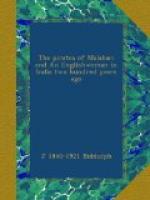At this juncture an unexpected way of escape presented itself. Twelve months before this, Commodore Matthews had arrived in Bombay with a squadron of the Royal Navy for the suppression of piracy. But Matthews was more bent on enriching himself by trade than on harrying pirates; and, as his own trading was inimical to the Company’s interests and certain to set the Company’s servants against him, he had from the first assumed a position of hostility to the Company. Every opportunity was seized of damaging the Company’s interests and lowering the Company’s authority. All who were in the Company’s bad books found a patron and protector in Matthews; so, when in September, 1722, the flagship appeared in the Hooghly, Mrs. Gyfford was quick to grasp the opportunity, that presented itself, of bidding defiance to her pursuers. She at once opened communication with Matthews, and besought his protection. She was an unfortunate widow who had lost two husbands by violent deaths in the Company’s service, and, now that she was unprotected, the Company was trying to wring from her the little money she had brought away from Anjengo, while she herself had large claims against the Company. This was quite enough for Matthews. Here was a young and pretty woman with a good sum of money, shamefully persecuted by the Company, to which he felt nothing but hostility. At one stroke he could gratify his dislike of the Company and succour a badly treated young woman, whose hard fate should arouse sympathy in every generous mind; so the Bengal Council were told that Mrs. Gyfford was now under the protection of the Crown, and was not to be molested.




